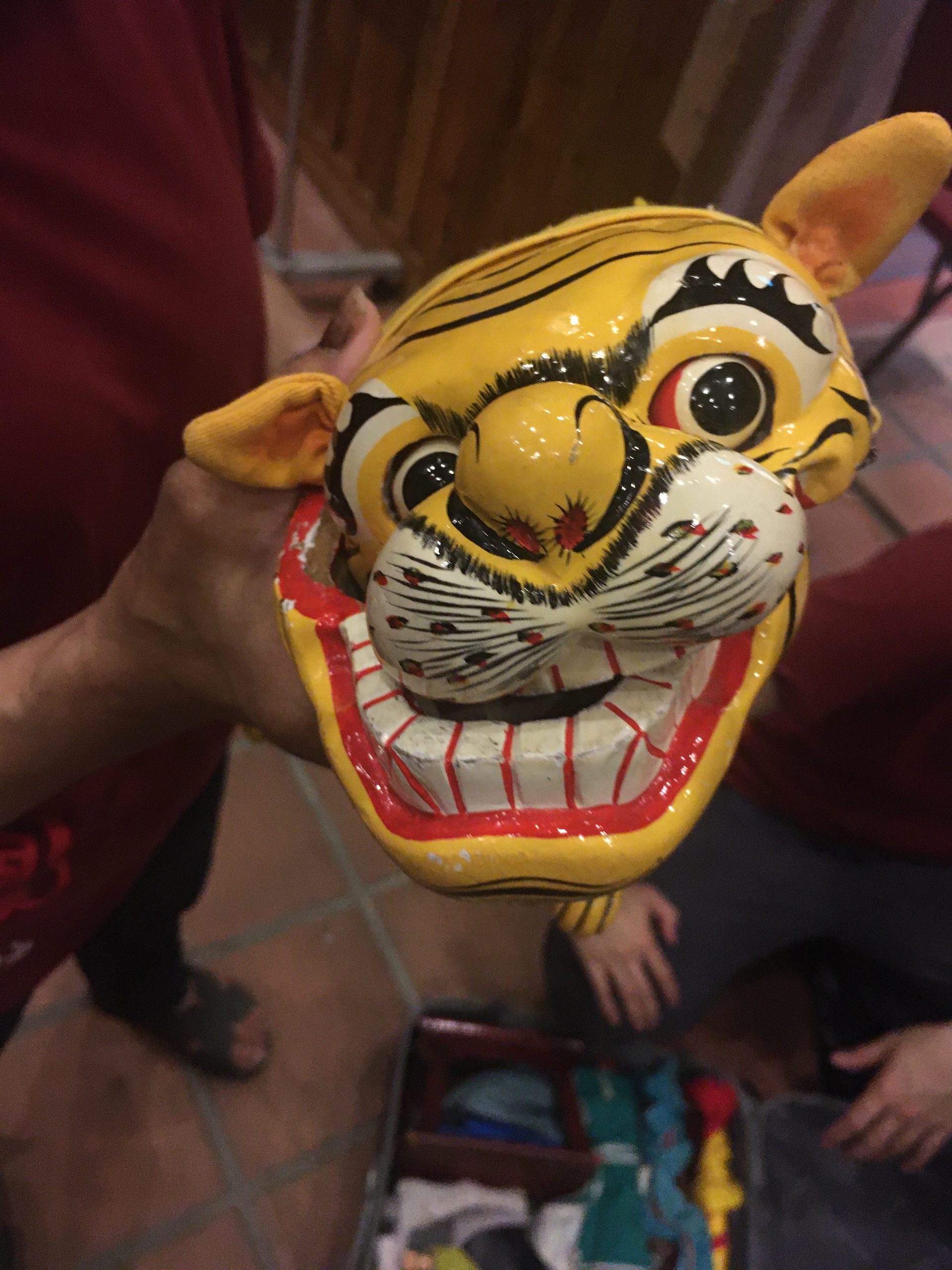Wu Song Fights the Tiger (Wu Song da hu) 武松打虎 is a well known Chinese tale that has “has survived and lived well in Chinese oral and written culture through seven hundred years to the present day, being transformed into many different genres of novel, drama, and storytelling.” (1)
“Wu Song fights the Tiger” was the first Budaixi play we ever saw performed live six years ago, when the I Wan Jan troupe set up a stage on the rooftop near Taipei Main station during a networking event organized by the Taipei Artist Village, where we had a two months artist residency.
We visited the I Wan Jan in 2015 to do an experiment and we visited again in 2021. We asked: Who is Wu Song? Can the tiger be replaced with a smart phone? Can Wu Song fight a smart phone? Will Wu Song defeat the smart phone?
Thank you 李奕賢 and 張家銘 from I Wan Jan for interpreting our questions, thank you 呂卿 for the translation. And thanks to 李天祿布袋戲文物館 for letting us use their precious traditional stage 彩樓 (translates as “colorful building”).
Some more thoughts on “WuSong fights the Tiger”: It’s been said that the struggle between Wu Song and the man-eating tiger in the Jingyang Ridge in Shandong talks about the battle between man and nature – nature as in one’s own human nature and nature as an external force. Some interpretations see the tiger as a symbol of temptation. More on that from (1) from this book: “Wu Song fights the Tiger – The Interaction of Oral and Written Traditions in the Chinese Novel, Drama and Storytelling by Vibeke Børdahl :
The meeting between the hero and the tiger on the mountain is the first major episode in Wu Song’s saga inside the novel of Shuihu zhuan. The rest of his story can be summarized as a series of encounters with beautiful and/or strong women, where he likewise manages to come out of the battle as a winner, in the sense that he resists sexual temptation. Not only does he beat the ‘tiger on the mountain’, but also the ‘tiger in the heart’. The codex for the bandit-heroes implied that sexual abstinence was seen as a major virtue. Wu Song’s fighting of the tiger and his fighting of women (and his own sexual feelings) seem a latent, if not explicit, theme in the Shuihu zhuan. His cruelty and bloodthirstiness grows from one episode to the next. China’s famous erotic novel Jin Ping Mei or The Plum in the Golden Vase, Jin Ping Mei cihua (1617), retells the tiger tale to form the first chapter. The later happenings between Wu Song and his sister- in-law, the extraordinary beauty and ‘man-eater’, Pan Jinlian or Golden Lotus, famous for her tiny ‘lotus feet’, is taken over to furnish the warp of the weft for the rest of this novel. With Jin Ping Mei the parallel between the tiger and the sexually potent woman is explicit:
This book is an instance of a beautiful woman who is embodied in a tiger and engenders a tale of the passion
如今這一本書。乃虎中美女。後引出一個風情故事 來。
Jin Ping Mei cihua, Chapter 1, 1982: 51
Apparently, the mountain tiger is the less formidable of these two opponents. To conquer his own heart is a battle Wu Song wins only at the cost of losing an essential part of his human empathy.
The figure of the tiger with its strong connotations of the supernatural – equal to dragons, the superhuman – equal to kings and rulers, and the immortal – keeping up appearances even after death, might have been the occasion for a tale full of signs and wonders. One might imagine fantastic, hyperbolic and horror-inspired myths and beliefs making up the better part of Wu Song’s meeting with the big beast.
Contrary to such expectations, the tale of Wu Song and the tiger, both in novel, drama and performed narrative genres, provides little occasion for description of folk beliefs (in the sense of transcendental or magic rituals and convictions). What is related about the tiger and the tiger-killer is by and large coloured by a rationalism and psychological insight that seems divorced from what we might think of as folk religion in China and elsewhere. This extraordinary tale that surely has superhuman overtones, testifies mainly to a sceptical and mocking stance among storytellers and storytelling audiences in China, an example of detached ‘disbelief ’ vis á vis the supreme powers of nature, whether outside or inside man – the tiger of the mountain and the tiger in the heart. The suggestive irony, dry humour or even farcical comedy with which both the majestic animal and the imposing hero are treated, seem to be essential ingredients of a Chinese Weltanschauung that has deep roots in both upper class literati spare time reading and popular entertainment of the theatre and teahouse culture.
some photos from our interview with members of the I Wan Jan troupe.










